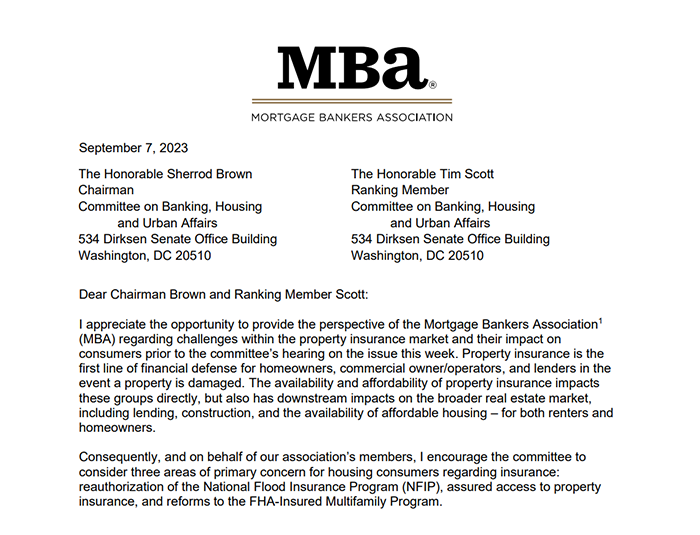
MBA Weighs in With Senate on Property Insurance Market

The Mortgage Bankers Association weighed in with the Senate Committee on Banking, Housing and Urban Affairs last week regarding challenges in the property insurance market and their impact on consumers.
The Senate committee held a hearing on the issue on Thursday.
“Property insurance is the first line of financial defense for homeowners, commercial owner/operators, and lenders in the event a property is damaged,” MBA Senior Vice President of Legislative and Political Affairs Bill Killmer said in the letter. “The availability and affordability of property insurance impacts these groups directly, but also has downstream impacts on the broader real estate market, including lending, construction, and the availability of affordable housing – for both renters and homeowners.”
MBA encouraged the committee to consider three areas of primary concern for housing consumers regarding insurance, reauthorization of the National Flood Insurance Program (NFIP), assured access to property insurance, and reforms to the FHA-Insured Multifamily Program.
The letter noted the most immediate insurance challenge before Congress is the expiration of the NFIP on September 30, 2023. “Flood insurance is mandatory for any property located in a high-risk area with a mortgage from a federally backed or federally regulated lender,” Killmer said. “New NFIP policies cannot be issued during a lapse in authorization. Existing policies that are set to expire can only be renewed if the application is received prior to the lapse and the premium is received within the 30-day grace period. Otherwise, policies will not be renewed until the NFIP is reauthorized.”
“Beyond this imminent threat – especially during hurricane season – a long-term authorization is vital to provide needed certainty to homeowners and small businesses that depend on the program for flood damage protection, to protect our residential and commercial real estate markets and to provide stability for the companies and agents that sell and administer the NFIP policies to millions of consumers across the country. A long-term authorization would also enable the NFIP to be reformed to better address commercial and multifamily lending and to incorporate climate change risks.”
Killmer also expressed concern that private property insurance has reached a point of critical market dislocation. “Many insurers and re-insurers have withdrawn from states like California, Florida, Texas, and Louisiana as climate change brings greater severity in weather events and property loss,” he said. “In some jurisdictions, increasing premiums to match the increasing risk is limited or prohibited by regulation. Western United States wildfires are driving a potential insurance crisis for many property owners, and recent studies indicate that decreased insurance availability and affordability may already be affecting the housing market in wildfire-exposed areas.”
“Today, as the risks increase, insurance coverage is either outright unobtainable or simply unaffordable. Insurance companies have significantly raised premiums (to the extent permitted) to price for increased risk and surging property replacement costs,” Killmer said. He noted commercial property premiums increased 20.4% in the first quarter of 2023–the largest increase in 20 years– and the 22nd consecutive quarter with premium increases, mainly due to catastrophic insurance premiums. “However, even with higher premiums, insurance (and re-insurance) companies still face significant financial loss and thus have withdrawn their offerings in high-risk areas, as reinsurers have also tightened standards. Fully 85% of brokers surveyed said insurers pushed for updates to replacement values and recent improvements, with significant tightening in catastrophic exposed properties,” he said.
The letter said MBA commercial lenders have reported the need to either “force-place” insurance or decide not to fund a loan due to insurance issues. “No homeowner or commercial property owner can cover the cost of a catastrophic loss alone,” Killmer said. “I encourage the committee to work with states and other stakeholders to address the availability and affordability of property insurance and promote market stability and insurer solvency.”
Finally, the FHA-Insured Multifamily Program must be reformed to align with the present realities of insurance markets. “Wind and Named Storm insurance coverage is justifiably a requirement for FHA Property General Liability insurance policies in specific areas and states,” the letter said. “However, this coverage is difficult to place in the insurance market due to a lack of availability. In markets where insurance is available, the deductibles are often much higher than HUD’s allowable maximum deductible. In these situations, borrowers are forced to purchase deductible ‘buy down’ coverage to meet HUD requirements. If buy down coverage is available, the cost can add tens of thousands of dollars to the insurance and operating cost of HUD-insured projects. This additional cost is detrimental to the program’s mission and creates hardship for all properties, but especially for affordable projects with restricted rents that are unable to be increased to cover unexpected operating costs.”
As the insurance market continues to evolve, HUD’s criteria must evolve as well. Killmer urged the Senate committee to conduct oversight of the FHA insurance requirements found in the MAP Guide 3.9.2.4 to make FHA Multifamily responsive to the urgent need for affordable housing.
“A closely related challenge is that, as storms increase in frequency and intensity, developers are utilizing stormwater detention ponds to protect their property. However, HUD considers any water sources shown on a National Wetlands Map prepared by the U.S. Fish and Wildlife Agency to be a wetland – even a newly-built stormwater detention pond,” Killmer said. He added that HUD then incorrectly requires borrowers to record a Restrictive Covenant on the stormwater pond as if it were wetlands. This policy is contained in the MAP Guide 9.6.7. “Detention ponds require frequent maintenance to function and are clearly not wetlands,” he said. “HUD should therefore not require a Restrictive Covenant but instead review its guidance to encourage – or at least not penalize – developers who utilize these measures to mitigate storm risks.”
Killmer commended the committee for holding this timely oversight hearing. “MBA looks forward to working with you and other committee members to advance bipartisan solutions to these three primary areas of concern,” he noted.
